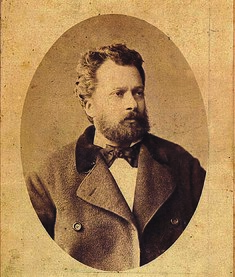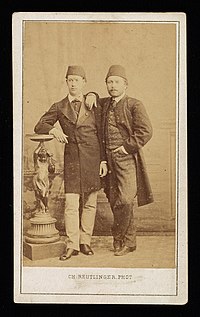Namık Kemal
Namık Kemal | |
|---|---|
 | |
| Born | Mehmet Kemal 21 December 1840 Tekirdağ, Eyalet of Adrianople, Ottoman Empire |
| Died | 2 December 1888 (aged 47) Chios, Vilayet of the Archipelago, Ottoman Empire |
| Resting place | Bolayır, Gelibolu, Turkey |
| Occupation | Poet, novelist, journalist, playwright |
| Nationality | Ottoman |
| Period | 1871–1888 |
| Literary movement | Nationalism Islamic modernism[1] Romanticism |
| Notable works | Vatan Yahut Silistre İntibah Cezmi Gülnihal |
| Turkish literature |
|---|
| By category |
| Epic tradition |
|
| Folk tradition |
| Ottoman era |
|
| Republican era |
|
Namık Kemal (
Early years

An
Political career
Young Ottomans
The Young Ottomans were a group of political activists whose members came principally from the young elite of Ottoman society.[13][14] The major goal of this group was to institute political reform according to the Western ideas of representative government.[13][14]
After joining the Young Ottomans in 1862, Kemal continually wrote essays on the subjects of political, administrative, social, and foreign policy reform.[15][16] In 1864, Kemal took over the pro-reform newspaper Tasvîr-i Efkâr after its previous owner and Kemal's friend İbrahim Şinasi was forced into exile.[16] In 1868, after being forced to seek refuge in Paris, Kemal began to handle the publication of the newspaper Hürriyet ("Liberty"), which also espoused the purpose of the Young Ottomans.[15] Kemal's papers rapidly became a popular venue for Young Ottomans to express their anti-sultanate and pro-parliamentary sentiments.[16] However, as a result of their outspokenness, many Young Ottomans were, like Kemal, forced to flee the empire and seek refuge in Western Europe.[16]
Namık Kemal admired the constitution of the French Third Republic, he summed up the Young Ottomans' political ideals as "the sovereignty of the nation, the separation of powers, the responsibility of officials, personal freedom, equality, freedom of thought, freedom of press, freedom of association, enjoyment of property, sanctity of the home".[17][18][19]
Namık Kemal drew on the parliamentary constitution of United Kingdom, in preference to that of France which, under Napoleon III, he considered too authoritarian. London on the other hand, with its "indomitable power of public opinion against authority" he saw as the "model of the world" in political principles.[20]
Ideology and exile

Namık Kemal was heavily influenced by Western conceptions of the relationship between the government and the people.
In 1869 or 1870, Kemal was allowed to return to Constantinople and proceeded to write for a number of Young Ottoman-run newspapers, and eventually published one of his own, İbret ("Admonition"), in which he addressed more intellectual, social, and national subjects.[15] One of the newspapers he contributed to during this period was Basiret.[23]
In addition, it was after his return to Constantinople that Kemal wrote his most significant and influential work: the play
His masterpiece, "Ode to Freedom" summarizes his political views.[26]
Later career

Like many
Despite Murad's abdication, the first Ottoman Parliament, the General Assembly of the Ottoman Empire, was established in 1876, largely as a result of pressure from the Young Ottomans, as well as Midhat Pasha’s political influence.[30] However, while, at first, Abdul Hamid II, the sultan who succeeded Murad V, was willing to allow Parliament to function, he quickly decided that it was easier for him to enact reform by seizing autocratic powers instead of waiting for the approval of elected officials.[31] In order to successfully implement his autocratic rule, Abdul Hamid II exiled many Young Ottomans, including Namık Kemal, who were critical of his decision to disregard the Parliament.[32] Thus, for the third time, Kemal was removed from Constantinople by being forced into an administrative position in Chios, where he would die in 1888.[15][32][33]
Legacy

Namık Kemal had an enormous influence on the formation of a Turkish national identity.[15] Kemal's focus on national loyalty, rather than loyalty to a monarch (influenced, as it was, by Western European ideals of self-government) contributed not only to the spread of democracy during the early 20th century, but also to the formation of the modern Republic of Turkey after the dissolution of the Ottoman Empire.[34] The founder of modern Turkey, Mustafa Kemal Atatürk, often remarked that he had been influenced by Kemal's writing as a young man, and that they had subsequently been a source of inspiration for his goals in the formation of the Turkish government and state.[35]
Bibliography
Novels
- İntibah yahut Ali Bey'in sergüzeşiti (1874), (Awakening, or, Ali Bey’s Experiences)
- Cezmi (1887/88), a historical novel based on the life of a 16th-century khan of the Crimean Tatars
Drama
- Vatan yahut Silistre (Homeland, or, Silistra)
- Akif Bey
- Gülnihal
- Kara Bela (The Black Curse)
- Zavallı Çocuk (Poor Child)
- Celaleddin Harzemşah
Literary criticism
- Bahar-ı Daniş Mukaddimesi (Foreword to "Spring of Wisdom")
- Terceme-i Hâl-i Nevruz Bey (Biography of Nevruz Bey)
- Mukaddime-i Celal (Foreword to Celal)
- Tahrîb-i Harabat (Criticism of "Harabat")
- Takip (Follow-up)
- İrfan Paşa'ya Mektup (Letter to İrfan Pasha)
- Renan Müdafaanâmesi (Defense against Renan)
- İntibah Mukaddimesi (Foreword to "Awakening")
- Mes Prison Muahezenesi (Criticism of Mes Prison)
Historical works
- Bârika-i Zafer (Spark of Victory)
- Devr-i İstîlâ (Age of Invasion)
- Evrâk-ı Perîşan (Scattered Documents)
- Silistre Muhâsarası (Siege of Silistra)
- Kanije Muhâsarası (Siege of Nagykanizsa)
- Osmanlı Tarihi Medhali (Introduction to Ottoman History)
See also
References
- ^ "Namık Kemal, the Enlightenment and the future of the Muslim world". Daily Sabah. 31 March 2018.
- ^ "Islam and Democracy: A False Dichotomy" (PDF). Archived from the original (PDF) on 9 August 2017. Retrieved 8 November 2017.
- ISBN 978-0-7486-3986-1.
- ISBN 978-0-714-64718-0.
- ^ "Namık Kemal | 19th Century Turkish Poet, Playwright & Social Reformer | Britannica". www.britannica.com. Retrieved 15 November 2023.
- ^ ISBN 978-1-4381-1025-7.
- ^ ISBN 978-0-688-08093-8.)
{{cite book}}: CS1 maint: numeric names: authors list (link - ISBN 978-1-4381-1025-7.
- ISBN 978-0-521-88878-3.
- ^ Nihal Atsız, Türk Tarihinde Meseleler, Ankara 1966, p. 144
- ISBN 9780195134605.
- ^ ISBN 978-0-521-29166-8.
- ^ ISBN 978-0-521-29166-8.
- ^ ISBN 978-0-8156-3085-2.
- ^ ISBN 978-1-4381-1025-7.
- ^ ISBN 978-0-521-29166-8.
- ISBN 978-9633860168. Retrieved 6 May 2017.
- ISBN 978-0748688784. Retrieved 6 May 2017.
- ISBN 0-691-14617-9. p. 104.
- ^ Lord Kinross Ottoman Centuries
- ^ ISBN 978-1-4381-1025-7.
- ^ ISBN 978-0-688-08093-8.)
{{cite book}}: CS1 maint: numeric names: authors list (link - S2CID 144548203.
- ^ Hearing the Crimean War: Wartime Sound and the Unmaking of Sense. Gavin Williams p.37
- ^ ISBN 978-0-688-08093-8.)
{{cite book}}: CS1 maint: numeric names: authors list (link - ^ "Ode to Freedom - A Poetic Translation | Tamga Türk". www.tamgaturk.com. Archived from the original on 4 August 2020.
- ISBN 978-0-688-08093-8.)
{{cite book}}: CS1 maint: numeric names: authors list (link - ISBN 978-1-4381-1025-7.
- ISBN 978-0-688-08093-8.)
{{cite book}}: CS1 maint: numeric names: authors list (link - ISBN 978-0-521-29166-8.
- ISBN 978-0-521-29166-8.
- ^ ISBN 978-0-688-08093-8.)
{{cite book}}: CS1 maint: numeric names: authors list (link - ISBN 978-0-521-29166-8.
- ISBN 978-0-521-29166-8.
- ISBN 978-1-4381-1025-7.
